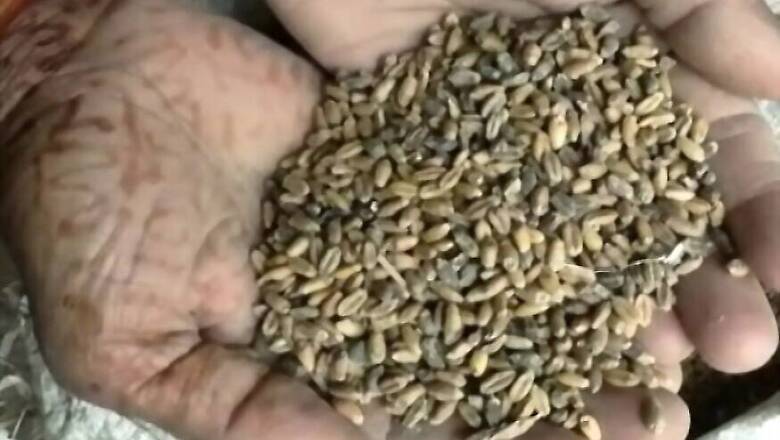
views
New Delhi: The wholesale oils and oilseeds market remained subdued for yet another week with select edible oil prices sliding further owing to easing demand from retailers and vanaspati millers against ample stocks on increased supplies from producing belts.
Castor oil in the non-edible section, also moved down due to reduced offtake by consuming industries.
Traders said besides fall in demand from retailers and vanaspati millers, ample stocks position on increased supplies from producing regions mainly kept pressure on select edible oil prices.
Meanwhile, import of vegetable oils fell by 7 per cent in March to 11.09 lakh tonnes due to higher domestic output of oilseeds.
The country had imported 11.9 lakh tonnes of vegetable oils (edible and non-edible oils) in March 2016.
In the national capital, palmolein (RBD) and palmolein (Kandla) oils drifted lower by Rs 50 each to Rs 5,550 and Rs 5,600 per quintal, respectively.
Soyabean refined mill delivery (indore) and soyabean degum (Kandla) oils followed suit and fell by Rs 100 each to Rs 6,700 and Rs 6,400 per quintal, respectively.
Mustard expeller (Dadri) too shed Rs 50 at Rs 8,250 per quintal.
On the other hand, groundnut oil prices moved in a narrow range in scattered buying or selling and pegged at last week's level of Rs 10,600 per quintal.
In the non-edible section, castor oils drifted lower by Rs 200 to Rs 9,700-9,800, while linseed held steady at Rs 9,800 per quintal, respectively. (MORE)
drifted further lower at the wholesale grains market during the week following reduced offtake against adequate stocks position.
However, rice basmati edged up on scattered demand.
Traders said sufficient stocks position on the back of increased arrivals of new crop in the mandies from growing regions amid reduced offtake by flour mills, mainly kept pressure on wheat prices.
Besides, expectations of bumper crop this year also weighed on wheat prices, they said.
In the national capital, wheat (desi and wheat dara for mills) eased to Rs 2,200-2,500 and Rs 1,740-1,750 against last close of Rs 2,250-2,530 and Rs 1,755-1,765 per quintal, respectively. Atta chakki delivery followed suit and slipped to Rs 1,750-1,755 from previous level of Rs 1,760-1,765 per 90 kg.
Atta flour mills, maida and sooji also settled weak at Rs Rs 950-960, Rs 990-1,000 and Rs 1,100-1,110 as compared to previous levels of Rs 970-980, Rs 1,050-1,060 and Rs 1,190- 1,200 per 50 kg respectively in line with a wheat trend.
On the other hand, in the rice section, rice basmati common and Pusa-1121 variety edged higher to Rs 8,600-8,700 and Rs 7,000-8,300 from previous close of Rs 8,400-8,500 and Rs 6,800-8,100 per quintal, respectively.
However, other bold grain like barley rose by Rs 20 to Rs 1,580-1,600 per quintal. (MORE)
ved supplies from producing belts.
However, gram and its dal prices firmed up on speculative buying.
Marketmen said sufficient stocks position in the market due to increased supplies from producing regions against fall in demand from retailers, mainly led to the decline in select pulses prices.
Meanwhile, the government has created buffer stocks of 18 lakh tonnes of pulses so far and also decided to procure dals from farmers till April 22, Food and Consumer Affairs Minister Ram Vilas Paswan said.
The government had decided to create 20 lakh tonnes of buffer stock through imports and local purchase, after pulses price crossed Rs 200 per kg in the retail market last year.
In the national capital, arhar and its dal dara variety fell by Rs 50 and Rs 100 to Rs 4,500 and Rs 6,400-8,200 per quintal, respectively.
Masoor small and bold moved down by Rs 100 each to Rs 4,600-4,900 and Rs 4,650-5,000 per quintal, respectively. Its dal local and best quality enquired lower by a similar margin to Rs 5,100-5,600 and Rs 5,200-5,700 per quintal.
Urad moved both ways on alternate bouts of buying or selling and finally settled at Rs 5,800-7,400 from previous level of Rs 6,300-7,200 per quintal. Its dal chilka local, best quality and dhoya were down by Rs 100 each to Rs 6,400- 6,500, Rs 6,500-7,000 and Rs 6,900-7,100 per quintal, respectively.
Peas white and green declined by Rs 100 each to Rs 2,600 -2,625 and Rs 2,800-2,900 per quintal, respectively.
On the other hand, gram moved up to Rs 6,000-6,500 from previous level of Rs 5,800-6,200 per quintal. Its dal local and best quality traded higher by Rs 300 each to Rs 7,100- 7,400 and Rs 7,500-7,600 per quintal.
Besan Shaktibhog and Rajdhani quoted higher at Rs 2,700 each instead of Rs 2,550 each per 35 kg bag.
Grains: In a mixed pattern of trading, wheat prices drifted further lower at the wholesale grains market during the week following reduced offtake against adequate stocks position.
However, rice basmati edged up on scattered demand.
Traders said sufficient stocks position on the back of increased arrivals of new crop in the mandies from growing regions amid reduced offtake by flour mills, mainly kept pressure on wheat prices.
Besides, expectations of bumper crop this year also weighed on wheat prices, they said.
In the national capital, wheat (desi and wheat dara for mills) eased to Rs 2,200-2,500 and Rs 1,740-1,750 against last close of Rs 2,250-2,530 and Rs 1,755-1,765 per quintal, respectively. Atta chakki delivery followed suit and slipped to Rs 1,750-1,755 from previous level of Rs 1,760-1,765 per 90 kg.
Atta flour mills, maida and sooji also settled weak at Rs Rs 950-960, Rs 990-1,000 and Rs 1,100-1,110 as compared to previous levels of Rs 970-980, Rs 1,050-1,060 and Rs 1,190- 1,200 per 50 kg respectively in line with a wheat trend.
On the other hand, in the rice section, rice basmati common and Pusa-1121 variety edged higher to Rs 8,600-8,700 and Rs 7,000-8,300 from previous close of Rs 8,400-8,500 and Rs 6,800-8,100 per quintal, respectively.
However, other bold grain like barley rose by Rs 20 to Rs 1,580-1,600 per quintal.
Pulses: Weak conditions persisted at the wholesale pulses market during the week with prices of select pulses falling further on easing demand from retailers against ample stocks position due to improved supplies from producing belts.
However, gram and its dal prices firmed up on speculative buying.
Marketmen said sufficient stocks position in the market due to increased supplies from producing regions against fall in demand from retailers, mainly led to the decline in select pulses prices.
Meanwhile, the government has created buffer stocks of 18 lakh tonnes of pulses so far and also decided to procure dals from farmers till April 22, Food and Consumer Affairs Minister Ram Vilas Paswan said.
The government had decided to create 20 lakh tonnes of buffer stock through imports and local purchase, after pulses price crossed Rs 200 per kg in the retail market last year.
In the national capital, arhar and its dal dara variety fell by Rs 50 and Rs 100 to Rs 4,500 and Rs 6,400-8,200 per quintal, respectively.
Masoor small and bold moved down by Rs 100 each to Rs 4,600-4,900 and Rs 4,650-5,000 per quintal, respectively. Its dal local and best quality enquired lower by a similar margin to Rs 5,100-5,600 and Rs 5,200-5,700 per quintal.
Urad moved both ways on alternate bouts of buying or selling and finally settled at Rs 5,800-7,400 from previous level of Rs 6,300-7,200 per quintal. Its dal chilka local, best quality and dhoya were down by Rs 100 each to Rs 6,400- 6,500, Rs 6,500-7,000 and Rs 6,900-7,100 per quintal, respectively.
Peas white and green declined by Rs 100 each to Rs 2,600 -2,625 and Rs 2,800-2,900 per quintal, respectively.
On the other hand, gram moved up to Rs 6,000-6,500 from previous level of Rs 5,800-6,200 per quintal. Its dal local and best quality traded higher by Rs 300 each to Rs 7,100- 7,400 and Rs 7,500-7,600 per quintal.
Besan Shaktibhog and Rajdhani quoted higher at Rs 2,700 each instead of Rs 2,550 each per 35 kg bag.


















Comments
0 comment